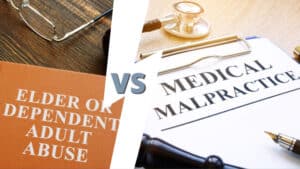Jonathan S. of Cow Hollow asks: “My grandfather just suffered from a stroke and I want to take time off from work to care for him while he recovers. I work at a large company, but my employer does not allow time off to care for grandparents, only parents. My manager told me if I take the time off, she could not guarantee I would have a job to return to. Are there any laws that would protect my job and allow me to take a leave of absence to care for my grandfather?”
Dear Jonathan, I’m sorry to hear about your grandfather. Under existing California law, there are no protections to take a leave to care for a grandparent. However, there may be some changes to the law in the near future that will allow you to take a job protected leave to care for your grandfather.
The California Family Rights Act (“CFRA”) entitles eligible employees of covered employers to take unpaid, job-protected leave for specified family and medical reasons. As currently drafted, CFRA ensures employees secure leave rights to care for the serious health condition of a child, parent or spouse, but not grandparents. CFRA also protects leaves for the birth of a child and baby-bonding, for placement of a child in the employee’s family for adoption or foster care, and for one’s own serious health condition. A serious health condition is defined as an illness, injury, impairment, or a physical or mental condition that involves in-patient care at a hospital, hospice, or residential health care facility, or continuing treatment or supervision by a health care provider.
While CFRA does not currently cover grandparents, the California Assembly just recently passed Senate Bill 406, which proposes to expand CFRA so employees could take leave to care for grandparents, grandchildren, siblings, parents-in-law, and adult children. The Bill is headed back to the Senate for a concurrence vote and then will be sent to the Governor for signature. If signed by the Governor, SB 406 will amend CFRA to allow eligible employees to take protected leave to care for grandparents, grandchildren, siblings, parents-in-law, and adult children as well.
SB 406, however, would not change the eligibility criteria under CFRA, and if the law is changed to include grandparents, you would still need to meet those criteria. To be eligible, you must be working in California, have worked for the employer for more than 12 months, have worked at least 1,250 hours in the 12 month period before the date the leave begins, and work at a location in which the employer has at least 50 employees within a 75 mile radius.
CFRA leave may total up to 12 weeks in a 12 month period and does not need to be taken in one continuous period of time.
Also keep in mind that before taking a CFRA leave, an employee needs to give notice to the employer, including the reason for the leave and the anticipated timing and duration. An employer may require 30 days advance notice before CFRA leave is to begin if the need for the leave is foreseeable. If 30 days’ notice is not possible (i.e., medical emergency), then notice must be give as soon as feasible. An employer must respond to a leave request as soon as possible, but no later than ten calendar days after receiving the request.
Although there are certain exceptions, generally, when an employee returns from CFRA leave, the employer must reinstate the employee to the same or comparable position. A comparable position is one that is virtually identical to the employee’s original job in terms of pay, benefits, and working conditions. It must comprise the same or substantially similar duties and responsibilities, skill, effort, and authority, must be performed at the same or geographically proximate work site, and must have the same or equivalent shift or work schedule.
Employers are prohibited from interfering with an eligible employee’s right to take CFRA leave, or discriminating or retaliating against an employee for taking a CFRA leave.
This article was written by Chris Dolan and published by The San Francisco Examiner. Click here to read more of Chris Dolan’s weekly articles at SFExaminer.com.









